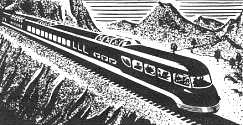|
These are only a few highlights of the background of our modern railroads. It was these things that helped our forefathers push back the wilderness and create the richest Nation in the world. It was these railroad pioneers who made possible that event on May 10, 1869, when our East Coast and West Coast were linked together with the golden spike ceremony that connected the Union Pacific and Central Pacific Railroads. Today there are over 400 thousand miles of railway track in the United States over which move some 45 thousand locomotives. To operate and maintain our railroads requires nearly a million and a half people, one of our greatest industries. During this war with less equipment and fewer employees than in the first World War it has handled 98 per cent more traffic - a remarkable record of efficiency.  Diesel Streamliner What the train of Tomorrow will look like, how it will perform will depend, like so many other things, on what you, the public, would like. |








